Gay relationships and Christ-like love: stories from students
Three student couples share their stories of finding identity and love at Calvin. Photo by Yolanda Chow.
Christian doctrine has historically held same-sex attraction to be a disorder — a mark of the fall — and same-sex intimacy to be a sin. As the college of the CRC, Calvin takes the position that “homosexual orientation is not a sin, and we strive to love our gay, lesbian, and bisexual students as ourselves, as God expects of us. We also affirm that physical sexual intimacy has its proper place in the context of heterosexual marriage,” as stated on their website.
But for many gay students at Calvin, this theology is not good enough. Instead, they’ve found a way to flourish by loving a partner of the same sex. Their pursuits of romantic relationships arise much like that of the sexual majority: out of a desire to love and be loved.
As we engage with these stories from within the Calvin community, may we remember that all of us, regardless of sexual orientation, are created in the image of the one who loves.
(Names of students have been altered to protect their identities.)
Story 1: Justin & Wyatt — Calvin as a safer space
For Wyatt, a recent Calvin alumnus, Calvin felt like a much safer place than his fundamentalist, Baptist upbringing, which enforced strong gender expectations, including the belief that same-sex attraction is itself sinful. When he learned about the CRC’s position, which allows for same-sex attraction but not same-sex relationships, he embraced it for a while.
However, when Wyatt shared his experience with former faculty member Lissa Schwander, the professor for the Grassroots floor class, her response shook him: “You don’t know what safety is. You’ve only been in non-safe places.” It made him realize that, although the CRC’s position was nicer than the context he grew up with, it was still not as safe as it could be.
Wyatt met Justin briefly in a class, and the two later connected again through Tinder, a dating app. Wyatt described Tinder as having two types of gay people: “those who are looking for hookups” and “lonely, gay Christians who don’t know how to meet each other.”
Justin, a junior, also came from a conservative community. Although he wrestled with same-sex attraction since he was eight, it took him a long time to see dating other men as a possibility. At QUEST orientation, he suggested to his group that gay men could still date women.
“A lot of the women looked at me like, ‘What are you talking about? I don’t want to date someone who’s not attracted to me.’”
Justin’s views began to shift when he encountered discussion of LGBTQ issues in a positive light for the first time, in peer education workshops hosted by the Sexuality Series at Calvin. A curiosity for what life was like for LGBTQ people led Justin to look into more of their stories, which gave him a greater awareness of LGBTQ experiences. Still, his struggle to accept his own identity was a long process.
“What really changed my mind was just my own lived experience — my own loneliness and longing to be with someone, and to have someone know me in a very emotional way,” said Justin. “From looking at the Bible, I can see how people can come to both different conclusions and I’m okay with [that], so long as they respect mine.”
Wyatt, now a seminary student preparing for ordination, emphasized that his position remains grounded in the Bible. For this couple, understanding the biblical text in light of the experiences of gay people has helped them come to the conclusion that marriage is a gift that gay people can participate in.
Justin and Wyatt both feel supported in their relationship. Wyatt reminds Justin that he can be spontaneous, and Justin’s acceptance of Wyatt makes him feel wanted. “I feel like I can be enough for someone, which is something I never thought that I would feel,” Wyatt said.
Wyatt had several pieces of advice for LGBTQ students:
“God loves you, not in a cheesy way, but a super radical way… Don’t let your difference be deemed a disorder… Be brave… Jump into a worship context… there are over 700 churches [in the Grand Rapids area]… One more thing, the loudest voices aren’t always the right voices.”
Justin added that his own privileged position as a white, middle class male contributed to his confidence in coming out as gay. For him, coming out was vital for being honest about himself with the people he knew, as well as replacing negative stereotypes about gay people. He encouraged LGBTQ people who are comfortable with themselves to “use that privilege to make it easier for the next generation of queer people to come to Calvin and to come out.”
Story 2: Grace & Irene — the perfect timing
Senior Grace is comfortably open about her sexuality as someone who is same-sex attracted. Growing up in a town with an openly gay mayor, her family has never expressed any negativity towards the LGBTQ community. In fact, their welcoming posture provides a safe space for junior Irene, Grace’s girlfriend, whose own family is less affirming of their relationship.
Despite the affirmation from her family, Grace’s home church spoke of homosexuality as sinful. As a devout Christian girl involved in youth group, Grace remembers thinking, “I can’t be gay, but even if I was, I would make myself be straight.” Clinging to what was seen as normal, she dated a boy for some time in high school, telling herself she would deal with her gay feelings in college.
On her first night at Calvin, Grace’s suitemate came out to her as bisexual and asked if Grace was LGBT. At that point, she was still unsure. But after some soul searching, she concluded that she was attracted to girls, and later still, that she was not attracted to men. Although she had planned to make herself appear straight by finding a boy to be with, she realized she only wanted to be with another woman.
Grace described meeting Irene as a rom-com miracle. Several unusual factors led to the two of them meeting on the main floor of Calvin’s library at a particular moment when neither of them were usually there. With her “really good gaydar,” Grace spotted Irene and complimented her hairstyle. Ten minutes after she left, Irene connected with Grace on Facebook and the two hit it off from there.
“The timing was perfect for both of us. [God] was definitely watching that,” said Grace.
Together, they have found support in each other, particularly with mental health issues they both deal with. Irene told Grace about emotional support animals, and although Grace had never been interested in pets, she ended up getting, and loving, a dog.
Grace knew she wanted a life partner long before she had even accepted her sexuality. If she had to choose between the church and living honestly as the person God made her to be, she was prepared to follow the latter. When Grace came across other interpretations of scripture that affirm same-sex relationships rather than prescribe celibacy, she found assurance in knowing that she could keep both.
Grace has appreciated participating in Chaplain Mary Hulst’s Bible study, which offers community with other gay students — a “secret gay club,” as Grace called it. She has also received positive, caring responses when coming out to classmates, faculty and staff.
Irene hopes that Christian communities can place less emphasis on marriage and relationships in order to provide space for single people as well.
“If you’re a Christian, I think we should be able to see the fruit, and one of the biggest ones is loving your neighbor and wanting to provide care for them just as people.”
Story 3: Jonah & Ben — a loving God
Jonah, a senior, and Ben, a junior, met through a mutual friend at Calvin. At the time, Jonah was not sure he wanted to date another man, since his Christian convictions had led him to believe it would be wrong. However, the two began spending more time together, and Jonah eventually realized he had romantic feelings for his friend.
When Jonah was in junior high, he was zealously involved with the church, leading Sunday school classes and accepting their position on homosexuality, which matched that of the CRC. In high school, he had a girlfriend, but found that he could not be emotionally attached to her. Instead, he found himself emotionally connected to some close male friends, but would not have dared call it love because he was afraid of its connotation of sin.
After high school, Jonah had a relationship with a male coworker that eventually fizzled out. By the time he came to Calvin, he was determined “to be a good Christian again” and resist the temptation to enter another same-sex relationship. However, thinking daily of his sexuality as “an abomination to God” led him to become depressed and constantly wonder if death was a better alternative. It was about this time that he met Ben.
At a time when he had internalized the idea that “God doesn’t hear the prayers of the wicked, and gay people are wicked,” a specific detail that Jonah discovered became personally significant to him. Just before they started dating, and before he had really gotten to know Ben, Jonah decided to translate the Aaronic benediction in Numbers 6. He discovered that the word “bless” shared the same verb meaning as Ben’s name in a certain language, which signaled for him a “very strong sensation of someone watching out for me at a time when I felt like no one was,” and a “personal touch of the Savior.”
Ben grew up in a country where homosexuality was not often discussed. This was not because of any religious objections, Ben said, but because preserving the status quo was highly valued. Although he finds that the conversation is more open in America, including at Calvin, Ben recognizes that “there’s still a lot of work to be done” in light of the fact that many states within the US still do not have anti-discrimination laws for LGBTQ people.
For Ben, it does not make sense that God would create gay people but not allow them to act upon their desires for love. This has also contributed to his own doubts about the faith he was raised in.
“I think it follows that a loving God would be okay with a loving relationship [between gay people].”
Jonah said, “I think [Calvin] is a wonderful place to explore a variety of ideas and talk with people. In general, it’s a good community. As a gay person at Calvin, I know a lot of people here and most of them know I’m gay and they’re fine. Take advantage of this place according to your comfort level, but don’t feel the need to hide away from everyone about yourself.”
Ben agreed. “The more you tell people, the easier it becomes to tell the next person.”
“On a fundamental level,” Jonah added, gay people “are no different — we’re still normal people. We’re not out to destroy the family; we’re not out to undermine God’s Word. The gospel message is for all people at all times and all places.”
Staff perspectives: Julia Smith, director of Calvin’s Sexuality Series & Pastor Mary, college chaplain — we keep loving
While some students have found value in same-sex relationships, others are more conflicted. Though the CRC does not condone same-sex unions, the denomination has been wrestling with questions of faith, sexuality and gender since the 1970s.
Julia Smith, the director of Calvin’s Sexuality Series, coordinates events such as the LGBTQ workshops in the dorms, which equip students to become more familiar with the LGBTQ conversation. Smith encourages prayer for the church and for LGBTQ people, recognizing that these are often questions that affect friends and family, not simply abstract issues to be debated.
“A helpful starting place is to humbly listen to others’ stories and experiences,” said Smith. She recommends engaging with resources that speak from a variety of Christian perspectives, including: the film “Through My Eyes” and the books “Two Views on Homosexuality, the Bible and the Church” by Preston Sprinkle et al. and “Oriented to Faith” by Tim Otto.
“LGBT+ people are as varied as any other group and have a huge array of gifts, personalities and callings,” continued Smith. Though she has been blessed and humbled by their stories, she has also learned that there is usually pain involved, often inflicted by Christians. She has also learned that “the place of an ally is often to step aside and allow others to speak.”
“At Calvin, we want to posture ourselves as being for all the students who choose to study here, including sexual and gender minority students,” said Smith.
Smith also coordinates a yearly “You Are Loved” group photo. This year’s photo will be taken on Friday, April 27, at 10:20 a.m. on Commons Lawn. All are welcome to buy a “You Are Loved” shirt and show their support for loving LGBTQ people, regardless of personal convictions.
Both Smith and college chaplain Mary Hulst emphasized that LGBTQ students do not have to feel alone and that they are happy to listen to and support students. Other people and groups on campus can also offer support, including the Sexuality and Gender Awareness (SAGA) student organization.
“I don’t think there is another population group that has more of a challenge in following Jesus and loving the church than our LGBT friends. And if they are here, it’s because they love Jesus and they want to grow as a disciple, and they love the church, despite a world that tells them they should walk away,” said Hulst.
Hulst pointed out that the CRC has, since 1973, made it clear that having an orientation toward same-sex attraction is not sinful.
“I’ve had students in my office weeping because they thought they were going to hell simply because they were attracted to the same sex,” said Hulst. “It’s wonderful to be able to say to them, ‘That’s not what the church teaches.’ … I think the church’s position allows us that space. It’s actually a very grace-filled position.”
Hulst also leads a Bible study group in her office that offers a space for LGBTQ students to be in community with each other. According to Hulst, the group started seven years ago when the chaplains realized they were having individual conversations with same-sex-attracted students who were not out to anybody else, and so the chaplains invited the students to get together. After reading through “Washed and Waiting” by Wesley Hill together, the students wanted to keep meeting. Now they follow the campus-wide Bible studies as a group every semester.
As a representative of the CRC, Hulst is clear with her group about her theological misgivings regarding same-sex marriage. Despite this, members of the group range from those who are committed to celibacy to those who hope to date and marry to those who have no idea how life will unfold but are seeking discernment.
“The gift I have received from them is that they love me, even if we don’t agree,” Hulst said. “They still show up, and we read the Bible and we eat chocolate.”
During the month of April, Hulst has been preaching on sexual relationships at LOFT, Sundays at 8 p.m. She will be speaking on the historical position of the church on same-sex relationships this Sunday, April 22.
Regardless of the variety of views at Calvin and within the church, Hulst’s advice for people on all sides begins the same: “love Jesus.”




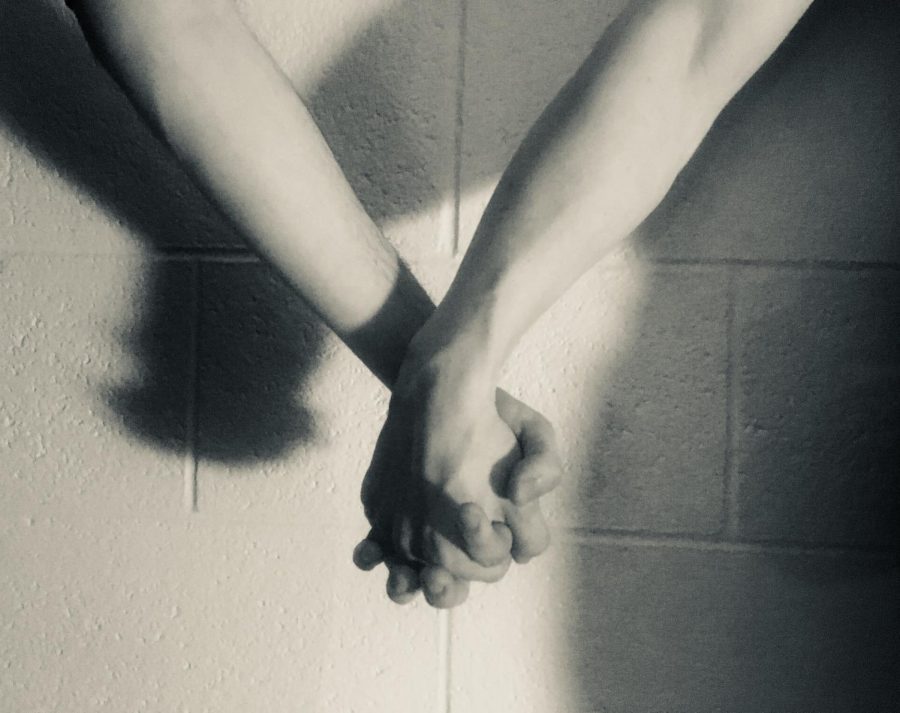



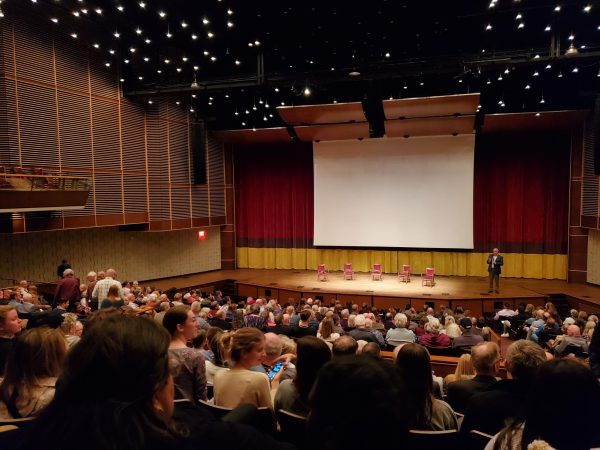
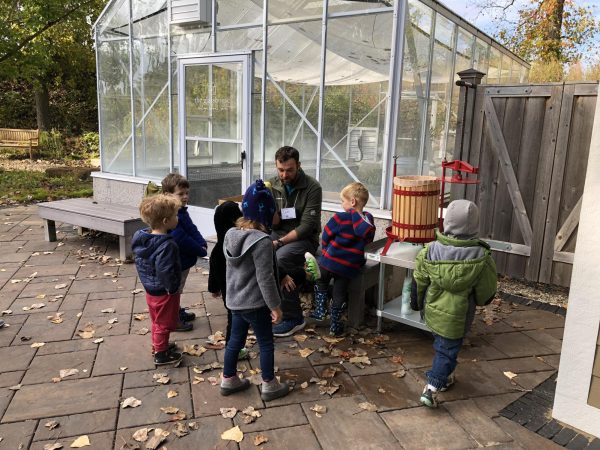


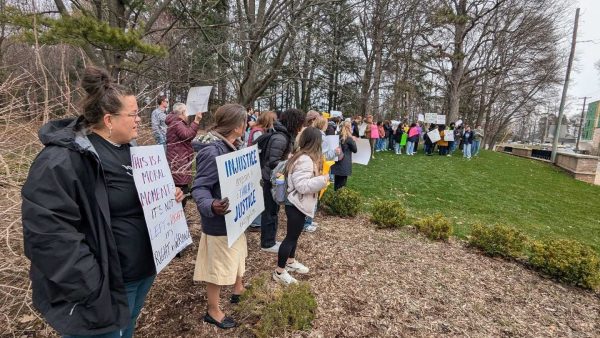
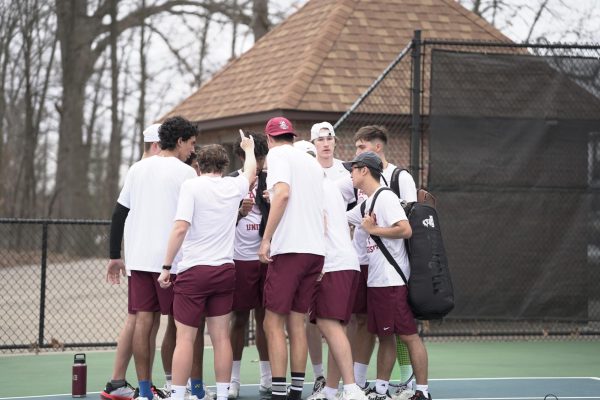
William Hark • Dec 11, 2020 at 9:41 am
Thank you for writing such an amazing article. I am glad that Calvin University has decided to give people the freedom to follow their convictions.
Keith • Aug 8, 2019 at 8:37 am
Excellent article Yolanda Chow.I can personally attest that the love felt between two gay men in a committed gay relationship is indeed christ-like,in its warmth,caring,gentleness, mutual support and affection.Having had a day when I felt an overpowering baptism in the church,I can declare that gay love is of the same essence as divine love,as gods love for us.They both spring from.the same source and are God inspired. It’s ludicrous to suggest that Christ like love can only be found in heterosexual marriage. It cam.be found in unmarried relationships,friendships and yes in gay relationships.
Calvin college is not being “heretical” or rebelling against scripture.There is a genuine and deeply felt difference of opinion in the body of believers,regarding the gay issue. Prominent evangelicals such as Tony Campolo have undergone an epithany on this issue,holy spirit led..
CRC shows true grace,because it espouses the traditional view,recognises the’s sincere differences in the body of christ,and unlike many other so called “christian” universities, shows christ like love for LGBT students.
Josh • Jul 16, 2018 at 6:05 pm
Yolanda, you’re getting a lot of flack from many of the comments on this article. All I want to say is thank you for helping make public the feelings and experiences of lgtbq people on campus. As a current Calvin student, articles like this are what promote better dialogue and make me feel more comfortable on campus. Love.
Tim Pennings • May 10, 2018 at 6:00 pm
Bravo to Calvin Chimes for taking an honest look at a controversial topic. From what I read, the article does not pass judgement either way – it just gives an honest look at the issues involved
Is not such an opening up and laying bear the very thing that sages from Jesus to Aristotle demand of us? Jesus repeatedly challenged and refuted the established religious norms. Aristotle said that the mark of an educated mind is one that can entertain an idea without [necessarily] accepting it.
Calvin College is showing itself to be a Christian liberal arts college in the best sense of the word.
Daniel Stubbs • Apr 25, 2018 at 1:45 pm
This article is very carefully written and conveys a message of Christ’s acceptance (grace) to those trapped in sinful behavior. I am concerned, however, that the article encourages (downplays) this behavior. Christ like love does not condone sinful behavior, it extends mercy and understanding for Christ alone is on the judgement seat and we are all sinners. Romans 1:18-31 and 2:1-16 state the facts of this quite clearly. Grace towards your fellow man is so important but it does not license Christians to undermine The Word. A word or warning, we must be very careful in what we teach and write about as representatives of Christ, especially regarding what The Bible says and what it does not say. Therefore, I leave you to consider what is written in Philippians 2 and Peace Be With You, My Sister In Christ.
Yolanda • Apr 28, 2018 at 11:01 pm
Peace to you too, Daniel.
What this article shows is that for some sincere Christians, same-sex behavior is no longer seen as sinful, and that there is a biblical case to be made for an affirming theology. (This article is not about making that case—you can dig more into that with resources like The Reformation Project—rather, this is about telling people’s stories.)
Remember Wyatt, a seminary student whose position is grounded in the Bible; Grace, who was invested in her church yet almost left it; and Jonah, who wants to tell you, “We’re not out to undermine God’s Word.” Remember how they wrestled with what they had been taught to get to where they are now. Even if you do not agree, listening to one another is vital to what it means to be the body of Christ. We do that from a place of humility (Philippians 2) that does not judge (Romans 2) because all of us are lost without God (Romans 1).
Daniel Stubbs • May 8, 2018 at 12:46 pm
I think you believe that I am placing myself in the judgement seat, as Christians we are called to test the spirits and make right judgements, not proclaim judgement. Again I tell you there is no biblical basis for the claims made in this article beyond the doctrine of grace available to all sinners. A warning, you are making representation of the mind of God based on peoples feelings about Gods Word. I am not arguing that grace is not available to all believers, but if we start making concession for sinful behavior where does it end? Understanding, grace, mercy, yes, yes, yes, but openly speaking against Gods Word…
Peace be with you,
Daniel
Angela • Apr 24, 2018 at 9:46 pm
How very sad to read. Another fine Christian institution capitulating to the very culture Christ followers should be called out of. Christian leaders who are not loving them, but leading these young people astray by not giving them the truth that will set them free. Does that mean we “clobber them” with Biblical passages condemning them? Of course not! We love them with the love of Christ and let them see their identity in Christ, NOT in their sexual orientation! Calvin College continues to bring in only speakers and messages that DO NOT align with the stance of the CRC and the Bible. Why are Reformed and loving people like Rosaria Butterfield, or James N. Anderson.not brought onto campus? Shame on you Calvin….I have always thought of my kids going to Calvin, but at this point it is clear that what they say they will teach my kids is not what they will actually be taught. Integrity has been lost and I could never choose or recommend Calvin College.
Bob • Apr 27, 2018 at 12:30 pm
I agree with your sentiments, but I think you should take the Chimes with a grain of salt. There are hundreds, of students possibly more, who like me were disgusted by this article, but don’t feel comfortable enough to speak out against it without anonimity. The Chimes is quite radical and doesn’t represent what Calvin teaches in classrooms. Otherwise, I wouldn’t choose to attend.
Yolanda • Apr 28, 2018 at 10:41 pm
Not sure where you read that the Christian leaders of this school are not loving, after all the examples to the contrary given in this story—including the chaplain who stands by the historical position of the church.
Let people find identity in Christ, yes—but Christ also made us with many aspects of identity, including sexual orientation, that we must live with, not ignore. Just as we ought to pay attention to other identity markers that affect how we live and interact with others, like race, class, and gender.
Calvin’s Sexuality Series has invited speakers that do align with the CRC’s stance, like Eve Tushnet and Wesley Hill, who are both celibate gay Christians. You can find many recorded events from the series on Calvin’s website. Perhaps you could also write to staff to suggest future speakers.
Calvin aims to teach its students to think deeply and act justly. As the article shares, what this looks like will vary when it comes to gay relationships. Calvin as an institution holds the CRC’s position, but both sides have a rich scholarship that people of integrity should not be afraid to engage with, regardless of what you believe to be true.
Wb • Apr 22, 2018 at 3:00 am
Doesnt matter my view on lgbt, but giving title “Christ-like” love to this piece is too far. Romance, dating isn’t Christ-like love, that is reserved for marriage. Christ did not die for us to gain this kind of freedom.
Yolanda • Apr 24, 2018 at 12:35 am
Christ-like love is the kind of love that lays your own life down for others (1 John 3:16). It can be found in all kinds of relationships—in friends, family, dating, marriage, and more. To say that it is limited to marriage implies that those who are unmarried, regardless of orientation, do not love like Christ.